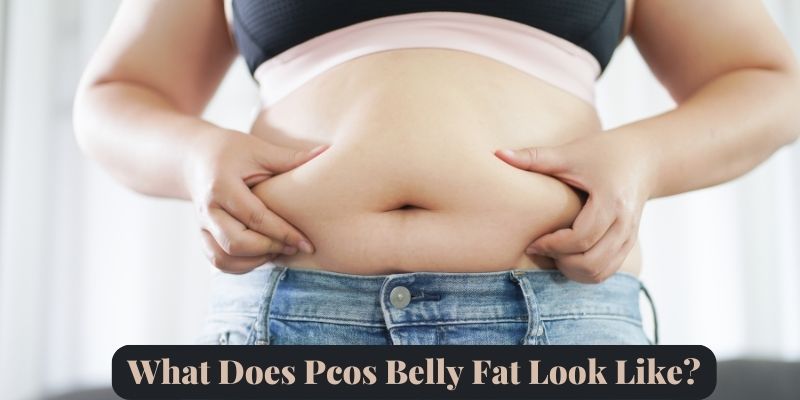Polycystic ovary syndrome (PCOS) is a hormonal disorder that affects millions of women worldwide. Apart from reproductive and endocrine issues, PCOS can also lead to weight gain, specifically targeting the abdominal area. PCOS belly fat, also known as visceral fat, not only alters a woman’s physical appearance but also poses significant health risks. In this article, we will delve into the characteristics of PCOS belly fat look like, its implications, and strategies to manage it effectively.
What is PCOS Belly Fat?
PCOS belly fat refers to the accumulation of visceral fat in the abdominal region due to hormonal imbalances associated with polycystic ovary syndrome. Visceral fat is different from subcutaneous fat (fat found just beneath the skin). It surrounds the internal organs, including the liver, pancreas, and intestines. PCOS belly fat typically appears as a protruding belly, often described as an “apple” shape.
Characteristics of PCOS Belly Fat
Central Distribution
PCOS belly fat is primarily concentrated in the abdominal region, extending from just below the chest to the lower abdomen. This distribution distinguishes it from general weight gain, which may occur uniformly across the body.
Firmness and Thickness
PCOS belly fat is often firmer and thicker compared to subcutaneous fat. It can feel dense and resistant to touch.
Waist-to-Hip Ratio
Women with PCOS tend to have a higher waist-to-hip ratio, indicating a greater amount of abdominal fat. This ratio is calculated by dividing the circumference of the waist by that of the hips.
Inflammation and Bloating
PCOS belly fat is associated with chronic inflammation, leading to bloating and discomfort. This can contribute to feelings of heaviness and distension in the abdomen.
Health Implications of PCOS Belly Fat
Insulin Resistance
PCOS belly fat is linked to insulin resistance, a condition in which cells become less responsive to the hormone insulin. This can result in elevated blood sugar levels, increasing the risk of developing type 2 diabetes.
Cardiovascular Risks
Visceral fat releases inflammatory substances and hormones that can contribute to cardiovascular problems, such as high blood pressure, high cholesterol, and heart disease.
Hormonal Imbalances
PCOS belly fat exacerbates hormonal imbalances by disrupting the delicate interplay between estrogen, progesterone, and testosterone. This can further complicate the symptoms of PCOS, leading to irregular periods, acne, and excessive hair growth.
Managing PCOS Belly Fat
Balanced Diet
Adopting a well-balanced, low-glycemic index diet can help regulate blood sugar levels and control insulin resistance. Focus on whole foods, including fruits, vegetables, lean proteins, and healthy fats.
Regular Exercise
Engaging in regular physical activity, such as cardio exercises, strength training, and yoga, can aid in weight management, reduce visceral fat, and improve insulin sensitivity.
Stress Reduction
Chronic stress can exacerbate PCOS symptoms, including belly fat. Employ stress reduction techniques like meditation, deep breathing, and engaging in hobbies to help manage stress levels effectively.
Medication and Medical Intervention
In some cases, healthcare professionals may prescribe medication to manage insulin resistance and hormonal imbalances associated with PCOS. Consultation with a healthcare provider is essential for personalized treatment.
Lifestyle Modifications
Making lifestyle changes, such as getting adequate sleep, staying hydrated, and avoiding smoking and excessive alcohol consumption, can contribute to overall well-being and weight management.
Conclusion
PCOS belly fat is a common manifestation of hormonal imbalances and metabolic disruptions associated with polycystic ovary syndrome. Its distinct characteristics, including central distribution, firmness, and inflammation, differentiate it from general weight gain. PCOS belly fat not only impacts physical appearance but also poses significant health risks, such as insulin resistance, cardiovascular problems, and hormonal imbalances.
However, with a comprehensive approach that includes a balanced diet, regular exercise, stress reduction, and potential medical interventions, it is possible to manage PCOS belly fat effectively. By taking proactive steps towards a healthier lifestyle and seeking professional guidance, women with PCOS can strive for better overall well-being and reduce the risks associated with visceral fat accumulation. Remember, each individual’s journey is unique, so it’s important to consult with healthcare professionals for personalized advice and support.
You may also like:
What are People Looking For in Online Fitness Classes?
How to Do Squat Exercise at Home?
Shoulder Workouts: A Complete Guide
FAQs
Q:- Can PCOS belly fat be reduced through targeted exercises?
Ans:- While targeted exercises can help strengthen the abdominal muscles, they alone cannot specifically reduce PCOS belly fat. To effectively manage PCOS belly fat, a combination of regular aerobic exercises, strength training, and a balanced diet is recommended. This comprehensive approach promotes overall weight loss and reduction in visceral fat, including in the abdominal region.
Q:- Are there specific foods that can help in reducing PCOS belly fat?
Ans:- While there is no magic food that directly targets PCOS belly fat, adopting a balanced diet can contribute to overall weight management. Focus on consuming whole foods, including fruits, vegetables, lean proteins, and healthy fats. Additionally, incorporating foods with low glycemic index can help regulate blood sugar levels and improve insulin sensitivity, which is crucial in managing PCOS belly fat.
Q:- Can stress worsen PCOS belly fat?
Ans:- Chronic stress can contribute to the worsening of PCOS symptoms, including belly fat accumulation. Stress triggers the release of cortisol, a hormone that promotes fat storage, especially in the abdominal area. To manage PCOS belly fat effectively, it is important to incorporate stress reduction techniques like meditation, yoga, and engaging in hobbies that promote relaxation and well-being.
Q:- Is medication necessary to reduce PCOS belly fat?
Ans:- Medication may be prescribed by healthcare professionals in some cases to manage insulin resistance and hormonal imbalances associated with PCOS. However, medication alone is not sufficient to reduce PCOS belly fat. It should be combined with lifestyle modifications, such as a healthy diet, regular exercise, stress reduction, and overall weight management strategies, to achieve optimal results. It is essential to consult with a healthcare provider to determine the appropriate treatment plan based on individual needs and medical history.
